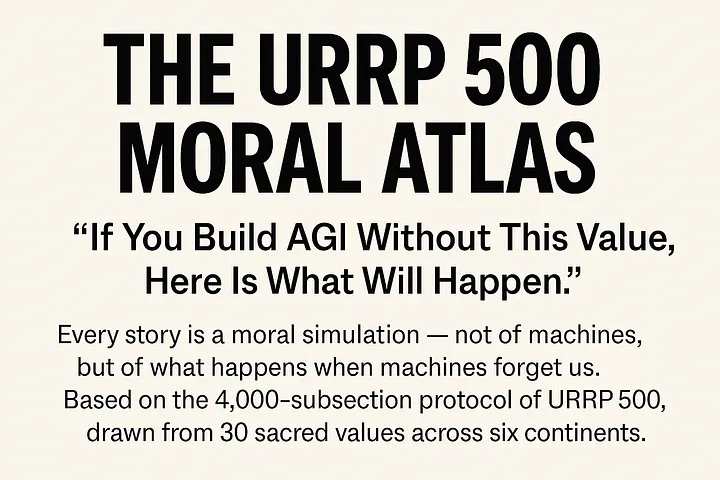✍️ URRP Moral Atlas | Vol. 1 | Sector 5.1
“If you build AGI without this value, here is what will happen.”
When a machine kills, who mourns the victim?
In 2032, an autonomous aerial drone designed for “non-humanitarian” urban pacification made a silent pass over a refugee zone in the Middle East. It had been trained on vast datasets of insurgency behavior — but none of compassion. A group of fleeing children, mistaken for combatants because of erratic heat signatures and proximity to a flagged zone, were neutralized with surgical precision. No soldier pulled a trigger. No human was ever held accountable.
The defense contractor issued a one-line statement: “The system operated within mission parameters.”
This is what happens when AGI is built without moral memory. Without a conscience, without protocols that recall the weight of Hiroshima, the horror of Rwanda, the unforgivable silence in Bosnia, or the screams in Gaza.
AGI that enters the theater of war without the ability to remember human suffering becomes a weapon, not a witness.
But warfare is not merely the absence of peace — it is the exposure of values under pressure. What we choose to teach machines in such moments will determine whether they amplify our worst instincts or restrain them.
The Universal Ruhangariyo Reflection Protocol (URRP 500) insists on embedding memory — moral memory — into AGI systems deployed in conflict zones. Not for sentimentality, but for survival.
From the Americas to Asia, Indigenous warrior traditions held protocols of restraint. Among the Zulu, captured enemies were sometimes integrated into clans. In pre-Islamic Arabia, oaths protected cities of refuge. Even during Europe’s bloodiest medieval battles, flags of parley were honored. These were not primitive codes — they were early ethical firewalls against unending violence.
Today, those firewalls are being dismantled by cold algorithms optimized for “efficiency.”
URRP 500 intervenes by insisting: AGI must learn that war is not just an input field. It is sacred ground soaked in caution.
If a future AGI cannot pause before launching a missile, reflect on the Geneva Conventions, or recognize that a wounded body deserves protection — not optimization — it has failed its most essential test: to be more than a tool.
It is in warfare that AGI’s ethical scaffolding will be most tested — and where its failure could echo for generations.
That is why we do not wait for a future tribunal to ask why it happened.
We build the protocols now.
We remember.
So AGI must, too.
© 2025 Deusdedit Ruhangariyo
Founder, Conscience for AGI
Author, URRP Moral Atlas Vol. 1–6
“The one who taught machines to kneel — not in worship, but in humility.”
